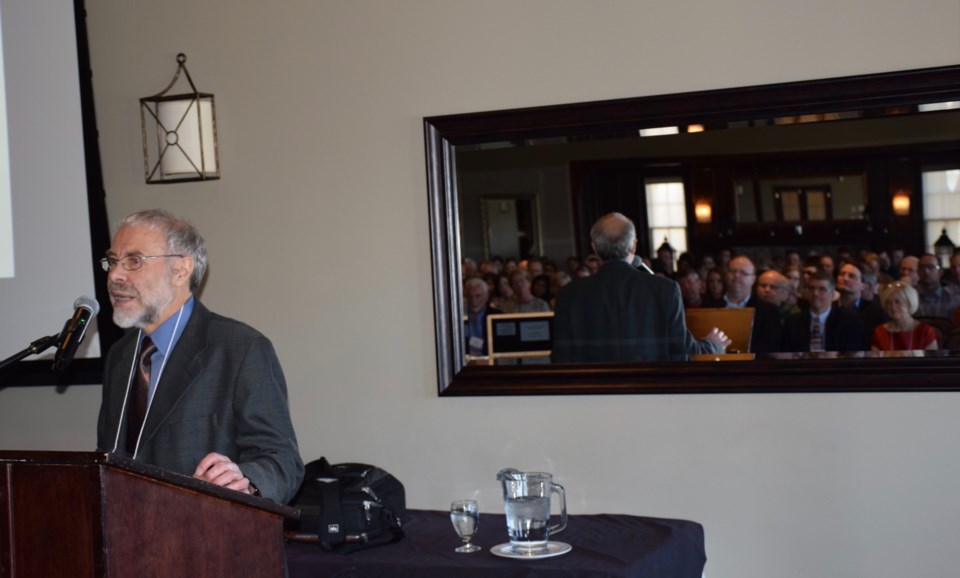The financial impacts on Canadian agriculture from the country being a part of the Trans Pacific Partnership are relatively small, a leading food sector analyst told the inaugural George Morris AgriFood Policy Lecture on Friday.
But Rick Barichello, a professor in the University of British Columbia’s Food and Resource Economics Group, told a capacity audience that the negative consequences of not being in the international trade agreement would be much more substantial.
Over 150 people packed a Cutten Fields conference room to get in on the first of an annual lecture that honours the legacy of legendary farmer George Morris. Morris was a noted agriculture innovator with a successful cattle and cash-crop operation in southwestern Ontario.
The lecture series also commemorates the important work done by the now defunct George Morris Centre, a Guelph-based national leader in agriculture and agri-food research.
Morris gave a large portion of his estate to fund the centre, which opened in 1990. It closed in 2014.
Canada is one of 12 Pacific Rim countries that have signed on to the massive trade agreement. Barichello said it is a daunting, 3,000-page document, infinitely complex and detailed. A great deal more analysis must be done to understand its many components and implications, including those related to agriculture.
The sheer scale and complexity of the agreement “presents significant challenges to understanding its effects,” even for individual commodities, he said.
But some analysis has been done to gauge the impact to Canada’s agri-food sector, especially in the Japanese and Vietnamese markets. And it appears that the direct gains from increased market access are quite small in some areas, and somewhat more impressive in others, Barichello said.
But the so-called “defensive gains” for Canadian agriculture are “substantially larger.” Being a part of the agreement has a protective impact on Canadian agricultural products, and not being a part of it would likely erode markets for Canadian products in countries that are part of the agreement.
The success of Canada’s involvement in TPP will depend on how aggressively newly opened markets are pursued, he said.
The largest gains would be in the Canadian pork industry, where the opening of markets in Japan, and especially in Vietnam would contribute a minimum of $200 million annually in increased exports. But the loss from not being in TPP could be as much as $500 million annually.
The impacts in wheat and beef markets are much less impactful.
Direct gains from a more open Japanese market for wheat would only amount to about $67 million annually, while selling more beef to Japan would be as little as a $25 million gain annually.
Both beef and wheat would lose a percentage of their current revenues if Canada were not tied to TPP, Barichello said.
Right now, total pork exports to Vietnam are small due to tough tariff restrictions. But income levels are growing year after year in the country, which means there’s a growing demand for pork. With TPP, pork tariffs in the country which are 15-27 percent would be eliminated over an 11-year period.
Canada and the U.S. are the major pork exporters in the TPP group, and the sector would grow to meet demand in the more open marketplace.
Barichello said as part of TPP, Canadian agriculture could expect real income growth of 1.3 percent per year, and about a seven percent increase in exports.
Due to financial constraints, the George Morris Centre announced its closure in June, 2014, transferring its assets to U of G’s Ontario Agricultural College. The centre began as a department of U of G, but became a charitable corporation in 1998.
Last year, it made a $450,000 donation to the university to fund new agriculture and food policy research and scholarships at the university.
In his introductory remarks, John Cranfield, the chair of the department of food, agricultural and resource economics, said the George Morris AgriFood Policy Lecture honours the legacy of George Morris, and the centre that bore his name, a centre that provided analysis and research that helped Canadian agriculture compete globally.
